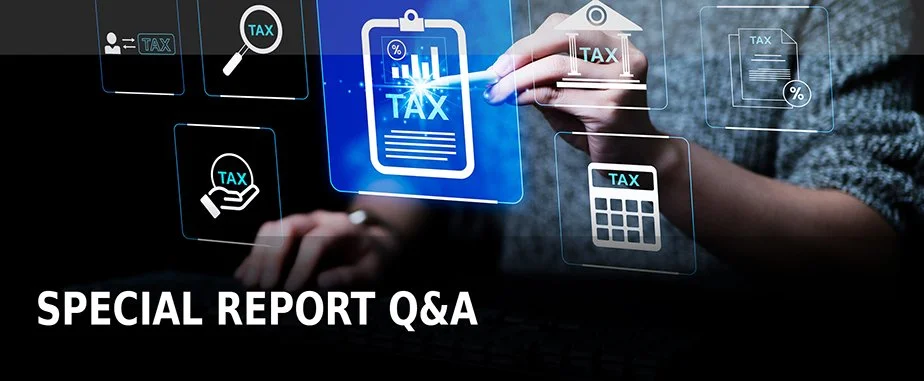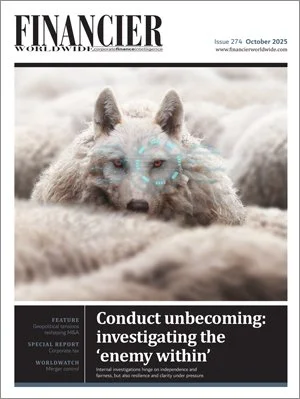Q&A: Futureproofing the tax function
October 2025 | SPECIAL REPORT: CORPORATE TAX
Financier Worldwide Magazine
FW discusses futureproofing the tax function with Romain Tiffon at ATOZ Tax Advisers.
FW: Could you outline the key trends and developments currently shaping the role of tax professionals? In your view, which factors are most significantly disrupting tax functions today?
Tiffon: The tax profession is experiencing unprecedented transformation driven by several critical developments. Artificial intelligence (AI) and automation likely represent the most significant disruptors impacting not only lower-added value services but also higher-added value ones. Pushed by the more rapid ingestion and analysis of data points facilitated by AI, we believe that one of the key trends will relate to the decision-making process. Tax professionals will be able to define tax strategies based on data analytics, thereby enhancing high-value work. The last five years have witnessed a sheer increase in regulatory complexity, and this is poised to expand amid tax regulations and trade disruptions. AI and automation will clearly play a critical role in supporting tax professionals as they navigate all these compliance challenges and ensuring they stay abreast of tax obligations. We may even see a shift in paradigm when it comes to compliance. Indeed, compliance has traditionally been perceived as reactive in nature, and it has the potential to become a more proactive strategic advisory service. We see a growing adoption of AI use among tax professionals. However, the adoption of AI still remains limited due to the overarching concern around data confidentiality. We believe that a more streamlined adoption will materialise once there is greater certainty that one can adopt a model specifically for tax functions which can work on proprietary data only, and that will not be used to further train the model.
FW: What major opportunities exist for tax functions to enhance their processes? How can these be leveraged to drive efficiency and strategic value?
Tiffon: Tax functions can dramatically enhance processes through three primary opportunities. First, routine compliance tasks, such as data gathering, reconciliations and actual reporting, can be largely automated, thus allowing tax professionals to focus on higher value add activities such as strategic advisory services. Organisations currently operate on fragmented data sets, which are difficult to utilise to create genuine value. The leverage that AI may bring can actually lead to another opportunity, which is to centralise data, including tax data, with a view to creating a single source of truth that would in turn enhance the decision-making process, as it would be based on a unified data set. By the same token, this would also elevate tax functions to become an even more strategic element of business and would also connect tax functions to the broader business operations. These opportunities converge to drive efficiency by eliminating manual workflows and transforming tax professionals into strategic business advisers.
FW: What practical steps can organisations take to strengthen the skillsets within their tax teams? How valuable is it for tax leaders to benchmark their function against peers or industry standards?
Tiffon: The surge of AI as a tool to support more traditional functions is triggering a complete rethink of the required skillset that is expected from teams, including tax teams. Organisations should invest in both technical and non-technical areas by prioritising hybrid skill development, which combines traditional tax expertise with technological proficiency. What that means in practice is that continuous learning programmes should include components pertaining to data analytics, AI tools and digital platforms. Benchmarking against peers and industry standards is highly valuable for tax leaders because it undoubtedly provides an objective view of where their function stands in terms of efficiency, technology adoption and strategic contribution. This external perspective helps identify capability gaps, prioritise investments and set realistic improvement goals. On a more forward-looking basis, benchmarking also offers insights into emerging best practices, allowing tax leaders to futureproof their teams and demonstrate to senior management that their function is both competitive and strategically aligned.
“The tax function will evolve into a strategic business advisory role powered by advanced technology. AI and automation will handle routine tasks, while professionals focus on complex analysis, strategic planning and business consultation.”
FW: How would you assess the impact of digitalisation on tax operations? What are the main implications of automation, advanced analytics and artificial intelligence for tax professionals?
Tiffon: Digitalisation is fundamentally transforming tax operations, creating both opportunities and challenges. Automation handles routine compliance tasks with unprecedented accuracy and speed, so that we are seeing a significant reduction in the time that is spent on repetitive and manual tasks such as data entry or reconciliation. This has the immediate effect of lowering the error rate and the associated compliance risks. Insofar as advanced analytics are concerned, we do not see this as fully mature, but it goes without saying that once it is, it will contribute to enabling predictive tax planning and real-time risk monitoring. For tax professionals, this shift means evolving from compliance processors to strategic advisers, thereby confirming the thesis whereby AI support will not replace individuals, but rather will enhance the value that they contribute to the business.
FW: With the rise of real-time digital tax reporting, how critical is it to invest in a unified data model that integrates information from enterprise resource planning systems, payroll and external sources?
Tiffon: Unified data models are critical for modern tax operations. Where an organisation currently relies on fragmented data sets – which is very frequently the case – it should clearly consider investment to achieve a unified data model. The reason for doing so is that real-time digital tax reporting demands seamless integration across enterprise resource planning systems, payroll platforms and external data sources. Without unified data architecture, organisations face compliance risks, reporting delays and operational inefficiencies. This is even more true considering that tax authorities increasingly demand immediate and accurate access to transactional data. A unified data model ensures standardisation, creating a single source of truth that enhances accuracy, transparency and audit readiness. On a reactive level, it also allows tax teams to automate reporting, respond quickly to regulatory changes, and perform advanced analytics for scenario planning and risk management. Beyond compliance, on a proactive level, integrated data strengthens alignment with finance and business functions, enabling tax leaders to provide real-time insights into operational and strategic decisions. Ultimately, a unified data model is not just a compliance tool but a foundation for efficiency, resilience and the elevation of tax as a strategic business partner.
FW: What key advice would you offer tax leaders to help them navigate economic challenges, rapid technological change and increasing compliance demands?
Tiffon: Tax leaders should take a proactive and balanced approach to navigating today’s complex environment. First, they should prioritise building agility into tax operations by leveraging technology to drive efficiency and free capacity for strategic work. Second, investing in talent is critical; upskilling teams in digital tools, data interpretation and cross-functional collaboration ensures resilience and adaptability. Third, strong governance and risk management frameworks help manage increasing compliance demands while minimising reputational and financial risk. In a digital-first world, forward-looking businesses need to transform the tax function to reduce costs, streamline workflows and maintain a competitive advantage. For example, automating VAT filings through enterprise resource planning-integrated tools can cut compliance cycle times dramatically, while using AI to flag anomalies in payroll tax data reduces the risk of penalties. Success requires balancing technological innovation with human expertise, such as combining advanced analytics platforms with the judgment of tax professionals to interpret results and advise leadership. It also means maintaining regulatory compliance while driving business value, for instance by leveraging real-time transaction data to meet e-invoicing mandates and simultaneously inform supply chain decisions. Finally, building resilient systems capable of adapting to future challenges is critical.
FW: Looking to the future, how do you expect the tax function to evolve? How confident are you that tax leaders can effectively futureproof their organisation’s tax capabilities?
Tiffon: The tax function will evolve into a strategic business advisory role powered by advanced technology. AI and automation will handle routine tasks, while professionals focus on complex analysis, strategic planning and business consultation. Real-time compliance monitoring will become standard, supported by integrated data platforms and predictive analytics. I am confident that forward-thinking tax leaders can successfully futureproof their organisations by embracing technological transformation, investing in skills development and positioning tax as a value-driving business function. Generative AI may help tax and finance functions struggling with cost, talent and regulatory pressures. The key is proactive adaptation rather than reactive response to change.
Romain Tiffon is a partner within the international & corporate tax team at ATOZ Tax Advisers. A tax professional since 2006, Mr Tiffon has experience in structuring pan-European alternative investment funds across all asset classes, as well as coordinating tax structuring advice and implementation for a wide range of institutional investors. He also has extensive experience in structured finance, M&A transactions and sovereign wealth funds, and is currently responsible for ATOZ’s DAC6 and other technological initiatives, working closely with ATOZ Solutions. He can be contacted on +352 26 940 245 or by email: romain.tiffon@atoz.lu.
© Financier Worldwide
Q&A: Futureproofing the tax function
Effective management of tax disputes for multinational enterprises
Managing a transfer pricing dispute: global perspectives
The US Model Income Tax Convention: emerging challenges and treaty evolution
Implications of HMRC’s desire to ‘shrink the tax gap’
Lessons from Australia’s ‘weaponisation’ of its income tax general anti-avoidance rules
Latest developments in South Africa in the context of tax controversy
Q&A: Tax considerations in cross-border M&A amid ongoing market volatility




